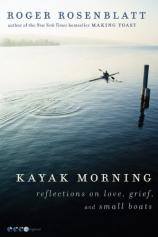Kayak Morning: Reflections on Love, Grief, and Small Boats
Review
Kayak Morning: Reflections on Love, Grief, and Small Boats
In his 2010 memoir, MAKING TOAST, journalist and essayist Roger Rosenblatt told of his family’s struggle to cope with the sudden death of his 38-year-old daughter Amy from a rare cardiac anomaly. From the moment he and his wife Ginny moved from Long Island to his daughter’s home in Bethesda, Maryland, to help their son-in-law care for three young children, the ordeal became one of shared grief and striving toward recovery. In his new memoir, Rosenblatt turns inward, extending and deepening the story of his struggle to come to terms with her loss.
"Deceptively simple as the surface on which its author’s vessel floats, KAYAK MORNING possesses a depth that invites multiple rereadings to reveal its many levels of meaning."
Two-and-a-half years after Amy’s death, Rosenblatt --- engaged in a one-way conversation with her as he sifts through fragments of memory --- concedes that the pace of his return to normal life has been slow. “What I failed to calculate,” he admits, “is the pain that increases even as one gets on with it.” To assuage that ache, one Sunday morning in late June 2010, he takes to the waters of Penniman’s Creek (“an inlet shaped like a wizard’s hat, squiggly on the sides and bent at the point”), which leads from the Village of Quoge on Long Island to Quoge Canal and onward to the sea. His vessel is a humble kayak, “a small narrow boat in which you sit at the center and propel yourself with a double-bladed paddle.” Threaded through the memoir are instructive and informative descriptions of the technique one must follow to stay afloat and avoid the disaster that can befall the inattentive or careless kayaker.
But this modest voyage in the simplest of watercraft launches Rosenblatt on a strikingly wide-ranging array of meditations on literature, language, nature and his personal history. He glides effortlessly from the macro to the micro, his thoughts always rooted in his search for answers to unanswerable questions.
With its references to catastrophes like the 1984 chemical leak in Bhopal, India, the crash of TWA Flight 800 in Long Island Sound only eight miles from Rosenblatt’s home in 1996, and descriptions of the suffering of children on whose lives he reported in his book CHILDREN OF WAR, Rosenblatt’s memoir brings to mind Annie Dillard’s meditation on mortality, FOR THE TIME BEING. In its most intimate moments, it recalls Joan Didion’s searing narrative of loss, THE YEAR OF MAGICAL THINKING.
Seeking some exit from his grief, Rosenblatt speaks with a therapist friend, and he offers snippets of their dialogues, most of them partaking of a koan-like quality. In one of those exchanges, he admits that when he finished MAKING TOAST, “it was if she had died again.” His friend recommends Brian Weiss’s MANY LIVES, MANY MASTERS, a book “about past lives and the continuity of our souls,” and though Rosenblatt approaches it as a skeptic, he concedes, “I was surprised how much I took to the spiritual part.”
Though when it came to spirituality, in MAKING TOAST Rosenblatt acknowledged, “My anger at God remains unabated,” and little has changed with the passage of time. Rejecting Albert Einstein’s assertion that “God does not play dice,” Rosenblatt asserts that “the supreme dice roller is precisely the God I believe in. The God who deserts the wreckage and doesn’t care. The God of my rage.”
As fiercely personal as Rosenblatt’s writing can be, it’s also enriched by moments of striking lyricism, like this one near the end of the book:
“The heart yearns in silence. The mind rages in silence. Decides in silence. Betrays in silence. The conscience roils plots, lies in silence. In silence, the rumination, the meditation, the vow. We search in silence. War in silence. Regret in silence. Love. We love in silence. Think of that.”
Equally compelling are the luminous passages of nature writing:
“Trees crack and rumble. Muskrats gnaw at the stumps. Even the plants are busy. Vines called bittersweet open into bright orange stars and glom onto bushes. At night, if you’re lucky, the comb jellies will light your way and glow like music in the dark.”
Philo’s admonition to “Be kind, for everyone you meet is carrying a great burden” serves as a kind of mantra for Rosenblatt. Despite his admission that “No man is an island, but I do my best,” one senses he has become more empathetic from an experience no one willingly would endure to achieve that status. Deceptively simple as the surface on which its author’s vessel floats, KAYAK MORNING possesses a depth that invites multiple rereadings to reveal its many levels of meaning.
Reviewed by Harvey Freedenberg on March 15, 2012
Kayak Morning: Reflections on Love, Grief, and Small Boats
- Publication Date: January 3, 2012
- Genres: Nonfiction
- Paperback: 160 pages
- Publisher: Ecco
- ISBN-10: 0062084038
- ISBN-13: 9780062084033





